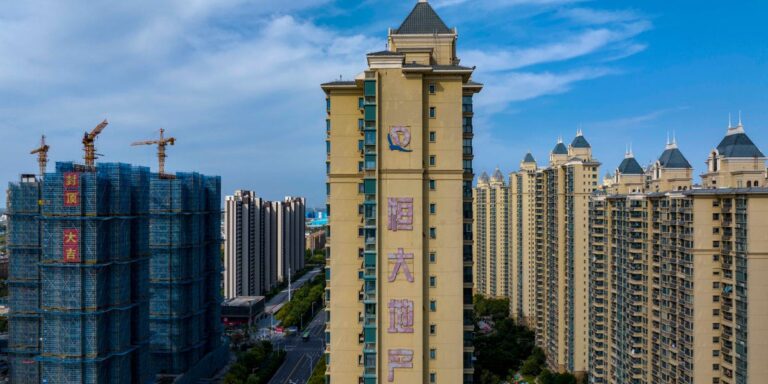China Evergrande — the world’s most indebted property developer — received a liquidation order from a Hong Kong court on Monday, but there may be little left to recover, said experts.
The order came more than two years after Evergrande sent the country’s property sector into a tailspin.
Liquidators will now take control of the company’s assets and prepare to sell them in order to repay the company’s debts, which total $300 billion.
An offshore investor named Top Shine Global brought the winding-up lawsuit against Evergrande in 2022. Its proceedings were adjourned multiple times as Evergrande sought more time to restructure its debts.
On Monday, Evergrande applied for another adjournment. But Judge Linda Chan said Evergrande had been unable to offer a concrete restructuring plan and ordered its liquidation.
“It is time for the court to say enough is enough,” said Chan, according to Reuters.
Trading in the shares of Evergrande and its subsidiaries was halted on Monday following news of the order. Hong Kong-listed China Evergrande Group’s stock price plunged 21% before the court hearing.
Evergrande did not immediately respond to a request for comment from BI.
Monday’s court order is a far cry from Evergrande’s heyday as China’s top developer by sales in 2016.
Evergrande has been mired in a liquidity crisis since 2021. It first defaulted on an offshore dollar bond in December of that year. The company filed for bankruptcy protection in the US in August and scraped a restructuring plan in October due to worse-than-expected property sales.
‘There are only losers in the collapse of Evergrande’
Siu Shawn, Evergrande’s CEO, told local media in China that the real-estate company will still ensure the delivery of homes in China, state-owned Securities Times reported on Monday.
But several experts BI spoke to prior to Monday’s court order said Evergrande’s liquidation will be challenging.
It’s bad news for creditors, Mat Ng, the managing director at Grant Thornton, a professional services firm that specializes in restructuring, told BI.
“Given its scale, a liquidation of Evergrande would be a challenging process and the likely return to creditors would be expected to be low,” said Ng.
That’s particularly since the Chinese property sector is in the dumps amid sluggish demand and falling home prices — which means any sale of Evergrande’s assets is likely to be at fire-sale prices, John Bringardner, the head of Debtwire, a fixed-income data and news provider, told BI in November.
“At this point in the process, there are only losers in the collapse of Evergrande,” Bringardner added.
In July, Evergrande cited an analysis by Deloitte that estimated a recovery rate of 3.4% on its debt if the company is liquidated, per Reuters. Creditors now expect the recovery rate at less than 3%, according go the news agency.
Investors also appear to be out of luck, particularly if they’re outside of China, and the process of getting their investments may take years.
“Onshore stakeholders are busy working to ensure home purchasers will eventually receive the homes they have paid for one way or another, but retail ‘mom and pop’ investors in the company’s offshore securities will be facing even further uncertainty and delay which would likely continue for years,” Daniel Margulies, a partner at Dechert, a law firm that specializes in restructuring in Asia, told BI.
The court order to liquidate Evergrande also signals that problems of this size in China “seemingly cannot be restructured and will likely end up in some form of liquidation, whether onshore or offshore,” said Margulies.
Evergrande’s liquidation comes as China’s economy continues to struggle
Evergrande’s liquidation comes as China’s economy faces significant headwinds from a property crisis, deflationary pressure, and a demographic crisis.
Market sentiment over China’s economy is so bad that the country’s stock markets sold down massively last week as investors made a dash for the exit door.
Despite the complications that could come with Evergrande’s liquidation, there may be some upside in the longer run.
“Evergrande’s liquidation is a sign that China is willing to go to extreme ends to quell the property bubble,” Andrew Collier, a managing director at Orient Capital Research, told Reuters.
“This is good for the economy in the long term but very difficult in the short term,” he added.


